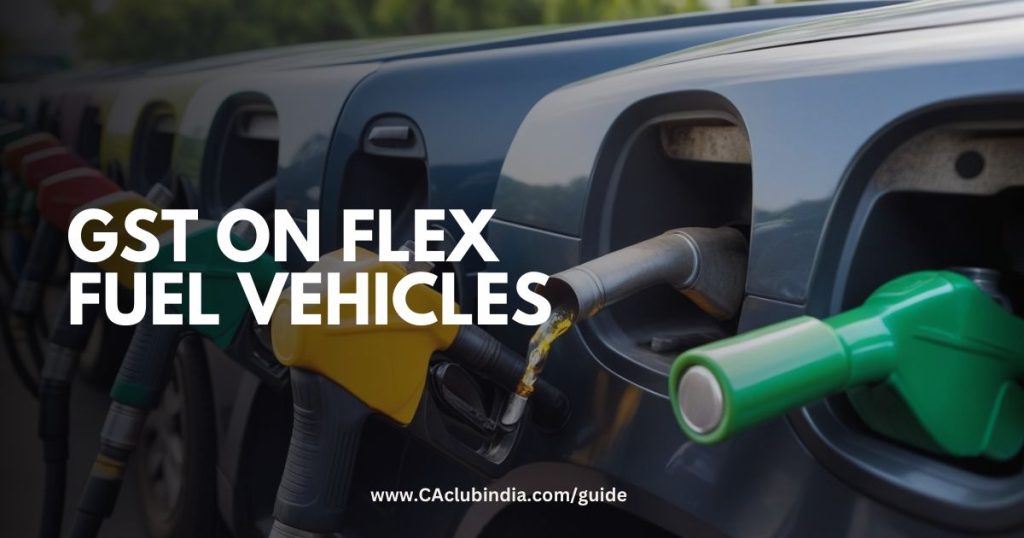GST on flex fuel vehicles shall reduce to 12% suggested by the Union Minister Nitin Gadkari to promote their use.

Introduction
Flex-Fuel Vehicles or Dual-Fuel Vehicles are those specialized vehicles that have engines which run on flexible fuel i.e., a combination of petrol and ethanol, which can include up to 100% ethanol. In order to accelerate the production of these vehicles, the Production Linked Incentive (PLI) scheme has included automobile and auto components of flex fuel engines. There are many companies like TVS, Bajaj Auto & Hero Motocorp who have or in the stage of developing these vehicles.
Why is this in the news……
Recently, Union Minister Nitin Gadkari has urged the state finance ministers to reduce the Goods and Services Tax (GST) on flex fuel vehicles to 12% in the GST Council meeting. He has also mentioned this move will help in reducing reliance on fossil fuels and promoting bio-fuels.
Higher rate of GST will become a barrier for environmentally friendly and sustainable vehicles. He has also stated that “Encouraging the use of bio fuels will not only cut down our fossil fuel imports but will also provide a boost to our farmers by creating new markets for agricultural produce.”
Minister of Petroleum & Natural Gas, H. S. Puri, emphasised that bioenergy is increasingly becoming a crucial alternative to fossil fuels, offering both environmental benefits and economic opportunities, particularly in rural areas.
Mr. Gadkari has also stated that the biofuel is less costlier and there is less pollution which is an added advantage to every common man and also helps in increasing exports. He also stated that automobile industry is giving maximum GST to state and central government.
GST on Flex Fuel Vehicles (FFV’s)
As per the 28th GST Council Meeting held in the year 2018 under the Chairmanship of then Union Minister Piyush Goyal, it was decided to charge 28% GST on these type of vehicles.
Hence, at present, 28% GST is charged for internal combustion engine (ICE) vehicles and hybrids and 5% on electric vehicles (EV’s).
Impact of flex fuel vehicles on the environment
Mr. Gadkari also pointed out that every year, India imports fossil fuels of up to ₹22 lakh crore, and it is not only a problem related to air pollution but also an economic problem.
And because of reducing imports of fossil fuels and encouraging bio-fuel, the minister said, it will more be beneficiary to the agriculture sector.
If we can have a good technology for bio-fuel, our exports will be increased by 10 to 20% more which in turn helps in creating jobs in the industry.
One of the remarkable achievements of the India’s ethanol blending programme was saving almost Rs. 99,014 crore in case of foreign exchange reducing CO2 emission and substituting crude oil.
It also had an economic impact with Oil Marketing Companies (OMC’s) disbursing Rs. 1,45,930 crore to distillers and Rs. 87,558 crore to farmers.
Pradhan Mantri JI-VAN Yojana has been launched to provide financial assistance for 2G (Second Generation) bio-ethanol projects / bio-fuel technology in India to provide and maintain a sustainable ecosystem.
Conclusion
The Society of Indian Automobile Manufacturers (SIAM) has written to the government asking for a reduction of GST on flex fuel vehicles from 28% to 18%, further to 12%. They have also requested to remove cess of 3% on all 2-wheelers which are above 350cc.
The Indian Sugar Mills Association (ISMA) has also requested the Ministry of Road Transport ad Highways for relaxation in the GST on FFV’s.
This impact of moving towards FFV’s will help in contributing to reduce India’s fuel imports and carbon emissions in the transport sector. It also helps in acknowledging ecological and environmental consciousness without bearing any financial burden.
Click here to know about Direct Tax Code

